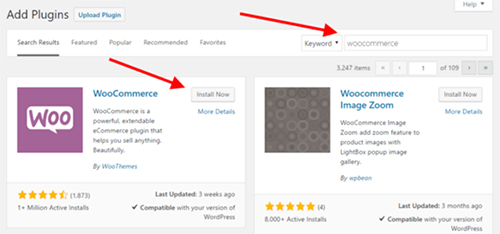Nowadays, e-commerce is growing very aggressively. And why not, it is a very popular medium for entrepreneurs looking for a practical and profitable business model!
If chosen wisely, it can bring a great profit to your business.
Today, people have various options when it comes to choosing eCommerce platforms. However, WooCommerce and Shopify are apparently the top contenders.
Both of these platforms are popular and well-organized to initiate online business. Therefore, users are often stuck with a question “which one should be the best eCommerce platform for me?
To ease this, we have attempted to give you a detailed comparison between WooCommerce and Shopify. Hopefully, it will help to make a better decision.
The full tutorial on Hostinger.
Pricing
When it comes to choosing e-commerce platforms, pricing should be the foremost thing to be considered. You obviously can’t go for a high-priced platform when you are on a low budget. Therefore, you must make your decision carefully and wisely considering the budget you have planned for your project.
Here is the price Comparision of both.
WooCommerce Pricing
WooCommerce is a free e-commerce plugin from the world famous CMS, WordPress. It means, if you are already having a fully functional WP site, you don’t require to pay a single dollar to setup e-store.
However, to create a WordPress site, you require the following prerequisites.
To know how to install WordPress manually, click here
- Domain Name
- Hosting Services
- WP Theme
- SSL Certification
The cost of WordPress site depends on the cost of your hosting plan. Except for theme, you can buy all of the above from one hosting provider such as Hostinger, Bluehost, DreamHost, SiteGround, etc.
It will surely reduce your expenses to a great extent as most hosting providers give free domain name, SSL Certification with their premium packages.
However, you can expect to spend $10/ mo for a basic eCommerce store with WooCommerce.
Shopify Pricing
Like WooCommerce, with Shopify, you do not get enough options for hosting plans as you have to choose from the options given by Shopify only.
Shopify has three plans Basic Shopify ($29/mo.), Shopify ($79/mo.) and Advanced Shopify ($299/mo.)
The small plan is suitable for the startup while Shopify plan is usually preferred by medium-level-business. Advanced Shopify plan is for giant enterprises.
All three plans come with free Shopify subdomain. However, if you want to get your own custom domain, you will need to spend $14 extra.
Installation
Ease of installation is very crucial. After all, how good your overall experience going to be will depend on it!
WooCommerce Installation
WooCommerce is basically a WordPress plugin that needs to be installed into a functional WP website to create an online store.

Here’s how to go about it
- To install the WooCommerce plugin, login to your WP account and go to WordPress dashboard.
- Now click on ‘Add New’ and search WooCommerce plugin then click on ‘Install’ and then ‘Activate’.
Setup Wizard
After activation of plugin, you will be taken to the on-screen setup wizard where different elements of the plugin will be explained to you, one by one in 5 steps. And in minutes your store is ready to run.
Now you have reached the place where you can start adding products and customize your store according to your requirements.
Shopify Installation
Opposed to WooCommerce, Shopify is a subscription-based service, which means it is readily available eCommerce platform.
To start with a Shopify store, you just need to sign up for it like you do with websites like Facebook, Twitter, etc. You can buy domain for your store, either from Shopify or a third party.
As soon as you click on ‘Get Started’ button, available on the homepage of Shopify.com, a window will ask you to add information like email address, password, and a store name.
Soon after, Shopify will take you through the setup wizard that will be followed by two steps and where you have to add information about you and your store. And you ready to get direct access to the Shopify’s dashboard as you can see in the following snapshot.
Conclusion
We can see both WooCommerce and Shopify are beginner friendly in terms of installation. Both provide simple and easy installation procedure to layman users who are not friendly with coding.
However, WooCommerce provides more ‘Settings’ option at the initial stage than Shopify.
Shopify comes with free SSL certification while the cost of same in WooCommerce totally depends on your hosting provider.
Design Options
WooCommerce
Speaking of designs and themes, WooCommerce is very extensible. There are more than thousands of WooCommerce WordPress themes developed by third-party globally. So, you have plenty of options.
Moreover, you can find a large number of free as well as premium themes from WordPress itself.
Shopify
Although Shopify too provides wide options for themes yet they are very limited compared to WooCommerce. Moreover, the official themes of Shopify are quite expensive than Premium WooCommerce theme.
Performance (Speed and Security)
Speed
Shopify is renowned for providing secure PCI compliant website hosting. The company has set up the top of the line infrastructure to ensure your customer load your eCommerce store quickly.
While the speed of WooCommerce website is totally dependent on your hosting plan. If you choose the low-quality plan, it surely brings some performance issues such as slow loading of the page, sudden downtime, etc.
Security
As mentioned above, Shopify comes with free SSL, so you need not worry about the secure connection from the web server to the browser. In short, you can be rest assured that your online store is always protected.
With WooCommerce as well, you get a variety of security options such as security plugins like Wordfence, iThemes Security, Sucuri Security, etc.
Moreover, you can buy SSL certification anytime from your hosting provider or any other third-party provider.
Wrapping Up
If we keep the comparison aside, undoubtedly, both WooCommerce and Shopify are the best eCommerce platforms to start the online store. Both are having their own set of strengths.
We hope this comparative analysis will help you to choose the more appropriate one.
 CoalesceIdeas Web and graphic design ideas for inspiration
CoalesceIdeas Web and graphic design ideas for inspiration


